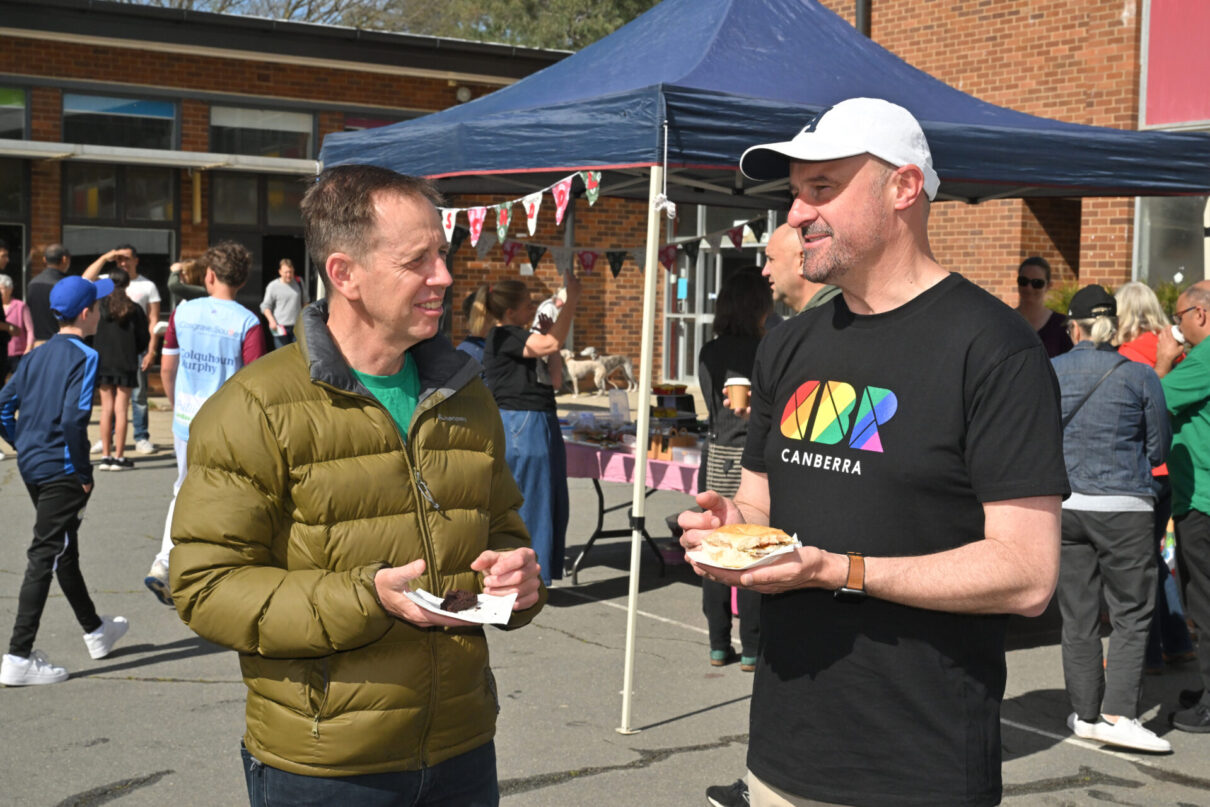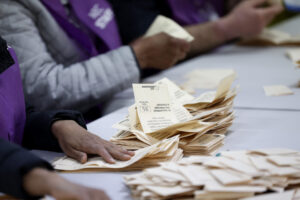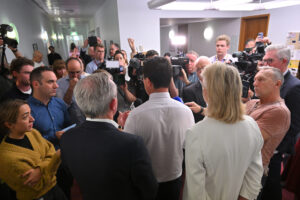Since the 2022 election, commentators and reporters have debated whether the wave of new independents was part of a broader movement or just the reflection of a moment.
Elections in the ACT and on the northern beaches of Sydney suggest a movement is on foot.
Canberrans elected two independents, whose vote swelled at the expense of both major parties and the Greens. In the NSW state electorate of Pittwater, the community (or “teal”) independent Jacqui Scruby was victorious in what was, until recently, a safe Liberal seat.
The shift is part of a decades-long decline in the major party vote. At the 1990 federal, election just 9 per cent voted for a minor party or independent. In 2022 the figure was 32 per cent, not far short of the primary votes for Labor and the Liberal-National Coalition.
With the Labor government in the ACT approaching a quarter-century of rule (sharing power with the Greens for most of that time), proportional representation allowed Canberrans to elect a counter-veiling force without replacing the government with the Liberal opposition.
While the two independents will not hold balance of power, as parliamentarians they can influence parliamentary debate, propose legislation and question the executive.
The independents also offer a glimpse at a path back to power for the opposition, a point made by the last Liberal chief minister to win election in the ACT. “For the Libs to get up, they really need more independents”, Kate Carnell said on election night.
Across the states and territories, major party politicians are warming to independents and minor parties, and even the value of power-sharing in minority and coalition governments.
In 2022, then NSW premier Dominic Perrottet said of minority government: “In some ways, it enhances the democratic process because when legislation comes through cabinet, you sit down with the crossbench and work through the issues.”
NSW entered minority government in 2021, and Jacqui Scruby’s success in Pittwater suggests voters are happy with the arrangement. Scruby’s win will also reassure community independents that their federal victories in 2022 were not a flash in the pan; Sophie Scamps in particular, as her federal electorate of Mackellar overlaps Pittwater.
Scruby made much of living in the electorate; her Liberal rival Georgia Ryburn lives about 10 kilometres outside it. Questions of geography were also fundamental to Dai Le’s successful campaign in Fowler in 2022 against a Labor senator parachuted in at the expense of local candidate Tu Le. At least in Fowler, Labor will not make the same mistake again – it has preselected Tu Le for next year’s election.
The ability of independent candidates to tailor their offering to the electorate has not been lost on major parties, with former Liberal prime minister Malcolm Turnbull observing: “even if the members of a political party cannot escape from the thrall of the dominant faction, their traditional supporters in the electorate can do so by voting for an independent who has a real chance of success”.
There is also a sense that major parties take safe seats for granted. Australia Institute research into the grants programs of the former Coalition government found marginal seats received much more funding than safe seats, and under national grants programs seats held by independent or minor party candidates received the most of all.
Perhaps it is unsurprising that after the Coalition incentivised its own safe seats to become more marginal, they did so.
Safe seat is something of a misnomer. It is really only a measure of how safe a seat is against the other major party. At the federal level independent and minor party candidates have won far more so-called safe seats in the past 20 years than they have marginal ones.
Federal commentary has failed to update to reflect that power-sharing governments are the new normal.
The Australian editorialised that a Labor-Greens minority government would be “diabolical”. Senior mining figures, hiding behind anonymity, have warned that a hung parliament would be an “unmitigated disaster”. It echoes warnings from Scott Morrison and Josh Frydenberg ahead of the 2022 election that a hung parliament would mean “chaos”.
Voters treated that fear-mongering with the respect it deserved in 2022, and since then there have been more hung parliaments – elected in NSW in 2023, in Tasmania in 2024, and re-elected in the ACT last week. Overall, the experience has been positive.
Remember, too, the record of the 2010 to 2013 Gillard minority government which passed more pieces of legislation than any other federal parliament including the Clean Energy Act, the Mineral Resources Rent Tax and the National Disability Insurance Scheme.
It is unclear how the major parties will respond to the secular decline in their vote. They may rethink the strict party discipline that has defined Australian party politics. This discipline was once moderated by Liberal backbenchers who frequently crossed the floor and by an activist Labor caucus. Professor Chris Wallace argues that the defection of senator Fatima Payman was a result of unhealthy caucus culture, not Labor’s solidarity pledge per se.
The danger is that instead of adapting to the mood of the electorate, the major parties will instead change election laws to give incumbents more advantages over new entrants.
Evidence from the states and territories is that major parties can use changes to donation laws masquerading as “integrity reforms” to further entrench incumbents. In Pittwater, for example, the cap on donations to Scruby as an independent was just $3800, while the Liberal Party could accept donations up to $7900.
Whether it is state, territory or federal elections, Australians are voting in greater numbers for independent and minor parties – and as a result power-sharing governments are becoming more common. The continued success of the major parties will depend on their ability to out-compete independent and minor parties or to share power with them.
Between the Lines Newsletter
The biggest stories and the best analysis from the team at the Australia Institute, delivered to your inbox every fortnight.
You might also like
Now that there are no safe seats – the ‘bellwether seat’ is no more.
Media analysis shows that the decade from 2007 was the bellwether era, but that era has now passed
Hearing voices: why the Nats should be watching their backs
The community independent movement did not begin in Sydney or Melbourne, but in the bush.
The major parties, not the independents are the big spenders at election time
The government says the electoral laws changes are about limiting big spending by independents, but community independents spent less per seat than the major parties at the 2022 federal election.


